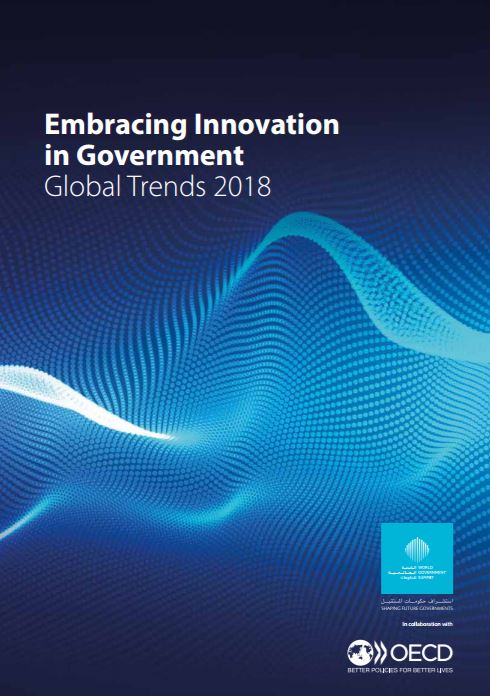Embracing Innovation in Government: Global trends 2018

Introduction
The current global political and economic setting is complex and fast-changing, with society transforming in ways that challenge existing views about the world and how it is governed. Technology is disrupting the status quo and creating a future of unknowns. Meanwhile, globalism has accelerated and a backlash has formed as a result of growing economic inequalities. Gender equality remains an uphill battle, conflict is forcing record numbers from their homes, trust in government is near record lows, and climate change and job automation crises are fast approaching. These challenges can seem insurmountable, but their significance is mirrored by the potential for governments to take action with new approaches to policies and services. Governments are rising to the occasion and innovating to cope with new realities and to build a better future for their people.
Trend 1: Identity
Every citizen, resident and business needs to have an identity to access government services and participate in society and the economy. While this seems simple, the process is often complicated and in many contexts can be controversial. Governments are conceiving of new ways of providing identities to individuals though biometrics and emerging technologies such as blockchain. They are also helping businesses make better decisions about their brand identities in an increasingly competitive marketplace, and helping citizens demonstrate the unique combination of knowledge, skills and experiences that make up their own personal identities. In the modern interconnected world, governments and individuals are also raising questions about national identity and re-imagining what it means to be a citizen in an increasingly borderless world. Government innovators are exploring these many aspects of identity and pursuing initiatives that serve as essential building blocks of innovation.

Aadhaar
Aadhaar is the largest biometric identity programme in the world. Since its launch in 2009, Aadhaar has enrolled nearly 1.2 billion Indian citizens and residents (about 15% of the global population), including over 99% of all Indian adults. Each Aadhaar recipient receives a unique 12-digit ID number, and submits their photo and their biometric data in the form of fingerprints and iris scans. Originally designed to help mitigate fraud, waste and abuse in social benefit programmes by ensuring benefits went to the right person, the initiative has grown to encompass many parts of everyday life in India, such as bank transactions and activating a mobile phone. Use of Aadhaar is mandatory for a growing number of these programmes. As the programme has grown, so has the controversy surrounding it, including a landmark November 2017 Indian Supreme Court ruling that for the first time recognised privacy as a fundamental human right, which may have implications for the future of Aadhaar. As far as digital identities are concerned, all eyes are on India.
???????? India
Trend 2: Systems approaches
The complexities of today’s problems require systemic change rather than simple, incremental responses. Technology, environmental challenges and citizens’ dissatisfaction with “business as usual” are all putting pressure on governments to change their working methods and reach beyond simple solutions and linear equations of cause and effect. This marks an innovative paradigm shift in governance. Rather than layering interventions on top of one another, the public sector should repack policies in ways that allow them to get to the real purpose of change and deliver value to citizens. Human wants, needs and desires are complex, and the systems created to satisfy them are even more so. If simple models are used to analyse them, they will produce simple answers. As human lives and the problems that affect them are intertwined, innovative working methods are needed that take this complexity into account and provide solutions that actually work. One way to address these challenges is to apply a more systemic approach to innovation. Systems approaches can have a transformative effect across the board in the public sector:
- They identify the real purpose behind the change process.
- They help to analyse the interlinked determinants behind complex problems.
- They help to design systemic innovations that work in specific contexts.

Predictiv
Predictiv100 is an online platform for running behavioural experiments. It enables governments to run randomised controlled trials (RCTs) with an online population of participants, and to test whether new policies and interventions work before they are deployed in the real world. After a short design phase, the tests take one to two weeks to complete, enabling policy makers to obtain responses to questions that would otherwise have taken many months (or years) to answer. As such, it has the potential to profoundly change governments’ working methods. While time constraints and political realities sometimes make it hard to run “field trials” on live policy, Predictiv makes experimental methods more accessible. However, it remains to be seen whether Predictiv will initiate a wider cultural shift in government departments and regulatory offices regarding the ways policies and processes are changed and implemented.
???????? United Kingdom
Trend 3: Inclusiveness and vulnerable populations
In the face of migration and ageing populations, uncertainties about the future of work and job automation, and continued gender and economic inequalities despite decades of attempted reforms, world governments are turning to innovation to help create more inclusive societies where no one is left behind – especially those who are most vulnerable.
Many countries have rallied behind global initiatives such as the Sustainable Development Goals (SDGs), while some have acted on their own initiative when confronted with unexpected threats to the well-being of their people. The last few years have seen record levels of people displaced from their homes due to violence and conflict and environmental factors such as climate change, as well as global waves of nationalism that limit the ability of these migrants to integrate well into their new communities.
The same period has witnessed targeted gender-inclusion initiatives and a reckoning for gender-based mistreatment, as well as continued disparities in pay and political inclusion. Other major issues are visible on the horizon, such as ageing populations and the displacement of jobs through automation. The world is at a crossroads with governments challenged to acknowledge new realities and create new solutions through innovation.

Financial Inclusion Programme for Migrants
The Financial Inclusion Programme for Migrants is an innovative financial services initiative that provides bank accounts and other support to a unique set of migrants – Mexican citizens repatriating from the United States amid a political climate that has added a great degree of uncertainty to their lives. To help these fellow citizens, the National Savings and Financial Services Bank (Bansefi), a development bank created by the federal government to reach vulnerable populations, has opened 11 strategically located services branches along the US-Mexico border and one at the Mexico City airport to provide them with financial services and education, which is a core requirement of repatriation.
???????? Mexico
Conclusion
This review has been conducted at a challenging and demanding moment in history, with disruptive technologies, globalisation and economic inequality combining to make public sector challenges more complex than ever before. This complexity is the core feature of most policy issues today; their characteristics are interrelated in multiple, hard-to-define ways, and new tools are required to help governments respond. However, governments are often ill equipped to deal with these problems. Existing structures, systems, processes and skills are not yet adapted to current realities, and it is clear that the status quo is insufficient to address the nature of today’s challenges.
As this review demonstrates, governments are viewing today’s challenges as a call to action to reconceive the basic underpinnings of how they function, their purpose, and how they engage with and support citizens and businesses. In particular, governments are innovating to:
- Build and scale digital identity programmes that serve as a foundation for innovative services, while supporting people and businesses to express their unique identities and spur discussions of national identity in an increasingly borderless world
- Embrace systems approaches and enablers to lead a paradigm shift in the way they provide services, by innovating to transform and re-align the underlying processes and methods of the business of government in cross-cutting ways
- Foster better conditions for inclusiveness and vulnerable populations, in order to address complex current and future problems, and to create a world in which no one is left behind and everyone has access to opportunities for a better life.
This report is a collaboration between OECD-OPSI and the Government of the United Arab Emirates (UAE) and its Mohammed Bin Rashid Centre for Government Innovation (MBRCGI).

Embracing Innovation in Government: Global Trends 2018
Published on 11 February 2018.
